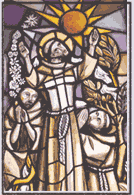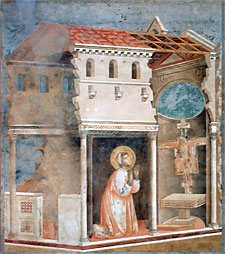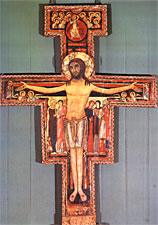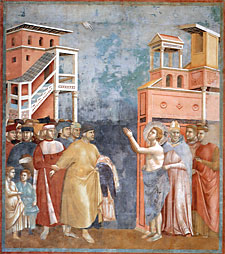St. Francis of Assisi
Freed by his mother during Bernardone's absence, Francis returned at once to St. Damian's, where he found a shelter with the officiating priest, but he was soon cited before the city consuls by his father. The latter, not content with having recovered the scattered gold from St. Damian's, sought also to force his son to forego his inheritance. This Francis was only too eager to do; he declared, however, that since he had entered the service of God he was no longer under civil jurisdiction. Having therefore been taken before the bishop, Francis stripped himself of the very clothes he wore, and gave them to his father, saying: "Hitherto I have called you my father on earth; henceforth I desire to say only 'Our Father who art in Heaven.'" Then and there, as Dante sings, were solemnized Francis's nuptials with his beloved spouse, the Lady Poverty, under which name, in the mystical language afterwards so familiar to him, he comprehended the total surrender of all worldly goods, honours, and privileges. And now Francis wandered forth into the hills behind Assisi, improvising hymns of praise as he went.
"I am the herald of the great King", he declared in answer to some robbers, who thereupon despoiled him of all he had and threw him scornfully in a snow drift. Naked and half frozen, Francis crawled to a neighbouring monastery and there worked for a time as a scullion. At Gubbio, whither he went next, Francis obtained from a friend the cloak, girdle, and staff of a pilgrim as an alms. Returning to Assisi, he traversed the city begging stones for the restoration of St. Damian's. These he carried to the old chapel, set in place himself, and so at length rebuilt it. In the same way Francis afterwards restored two other deserted chapels, St. Peter's, some distance from the city, and St. Mary of the Angels, in the plain below it, at a spot called the Porziuncola. Meantime he redoubled his zeal in works of charity, more especially in nursing the lepers.
On a certain morning in 1208, probably 24 February, Francis was hearing Mass in the chapel of St. Mary of the Angels, near which he had then built himself a hut; the Gospel of the day told how the disciples of Christ were to possess neither gold nor silver, nor scrip for their journey, nor two coats, nor shoes, nor a staff, and that they were to exhort sinners to repentance and announce the Kingdom of God. Francis took these words as if spoken directly to himself, and so soon as Mass was over threw away the poor fragment left him of the world's goods, his shoes, cloak, pilgrim staff, and empty wallet. At last he had found his vocation. Having obtained a coarse woolen tunic of "beast colour", the dress then worn by the poorest Umbrian peasants, and tied it round him with a knotted rope, Francis went forth at once exhorting the people of the country-side to penance, brotherly love, and peace.
The Assisians had already ceased to scoff at Francis; they now paused in wonderment; his example even drew others to him. Bernard of Quintavalle, a magnate of the town, was the first to join Francis, and he was soon followed by Peter of Cattaneo, a well-known canon of the cathedral. In true spirit of religious enthusiasm, Francis repaired to the church of St. Nicholas and sought to learn God's will in their regard by thrice opening at random the book of the Gospels on the altar. Each time it opened at passages where Christ told His disciples to leave all things and follow Him. "This shall be our rule of life", exclaimed Francis, and led his companions to the public square, where they forthwith gave away all their belongings to the poor. After this they procured rough habits like that of Francis, and built themselves small huts near his at the Porziuncola. A few days later Giles, afterwards the great ecstatic and sayer of "good words", became the third follower of Francis. The little band divided and went about, two and two, making such an impression by their words and behaviour that before long several other disciples grouped themselves round Francis eager to share his poverty, among them being Sabatinus, vir bonus et justus, Moricus, who had belonged to the Crucigeri, John of Capella, who afterwards fell away, Philip "the Long", and four others of whom we know only the names. When the number of his companions had increased to eleven, Francis found it expedient to draw up a written rule for them. This first rule,as it is called, of the Friars Minor has not come down to us in its original form, but it appears to have been very short and simple, a mere adaptation of the Gospel precepts already selected by Francis for the guidance of his first companions, and which he desired to practice in all their perfection.
When this rule was ready the Penitents of Assisi, as Francis and his followers styled themselves, set out for Rome to seek the approval of the Holy See, although as yet no such approbation was obligatory. There are differing accounts of Francis's reception by Innocent III. It seems, however, that Guido, Bishop of Assisi, who was then in Rome, commended Francis to Cardinal John of St. Paul, and that at the instance of the latter, the pope recalled the saint whose first overtures he had, as it appears, somewhat rudely rejected. Moreover, in site of the sinister predictions of others in the Sacred College, who regarded the mode of life proposed by Francis as unsafe and impracticable, Innocent, moved it is said by a dream in which he beheld the Poor Man of Assisi upholding the tottering Lateran, gave a verbal sanction to the rule submitted by Francis and granted the saint and his companions leave to preach repentance everywhere. Before leaving Rome they all received the ecclesiastical tonsure, Francis himself being ordained deacon later on.
- 2 -
- The description of St. Francis's Life in the site is short and incomplete. It gives an account of the main facts, but there are a lot of books, which open the personality of St. Francis more deeply.
- The history about St. Francis and Clare you can read in the section «St. Clare»
The prayer before the cross in San Damiano
The cross from San Damiano
The renunciation from his farther ment the begining of the new life, the life of the dedication to the God and to the pooriness.












